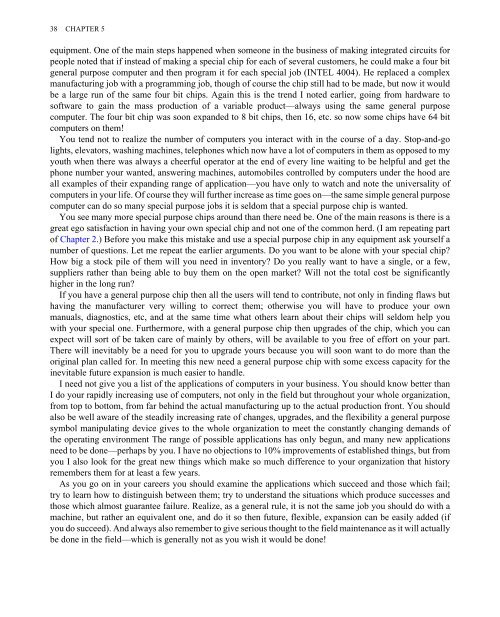hamming
hamming
hamming
You also want an ePaper? Increase the reach of your titles
YUMPU automatically turns print PDFs into web optimized ePapers that Google loves.
38 CHAPTER 5equipment. One of the main steps happened when someone in the business of making integrated circuits forpeople noted that if instead of making a special chip for each of several customers, he could make a four bitgeneral purpose computer and then program it for each special job (INTEL 4004). He replaced a complexmanufacturing job with a programming job, though of course the chip still had to be made, but now it wouldbe a large run of the same four bit chips. Again this is the trend I noted earlier, going from hardware tosoftware to gain the mass production of a variable product—always using the same general purposecomputer. The four bit chip was soon expanded to 8 bit chips, then 16, etc. so now some chips have 64 bitcomputers on them!You tend not to realize the number of computers you interact with in the course of a day. Stop-and-golights, elevators, washing machines, telephones which now have a lot of computers in them as opposed to myyouth when there was always a cheerful operator at the end of every line waiting to be helpful and get thephone number your wanted, answering machines, automobiles controlled by computers under the hood areall examples of their expanding range of application—you have only to watch and note the universality ofcomputers in your life. Of course they will further increase as time goes on—the same simple general purposecomputer can do so many special purpose jobs it is seldom that a special purpose chip is wanted.You see many more special purpose chips around than there need be. One of the main reasons is there is agreat ego satisfaction in having your own special chip and not one of the common herd. (I am repeating partof Chapter 2.) Before you make this mistake and use a special purpose chip in any equipment ask yourself anumber of questions. Let me repeat the earlier arguments. Do you want to be alone with your special chip?How big a stock pile of them will you need in inventory? Do you really want to have a single, or a few,suppliers rather than being able to buy them on the open market? Will not the total cost be significantlyhigher in the long run?If you have a general purpose chip then all the users will tend to contribute, not only in finding flaws buthaving the manufacturer very willing to correct them; otherwise you will have to produce your ownmanuals, diagnostics, etc, and at the same time what others learn about their chips will seldom help youwith your special one. Furthermore, with a general purpose chip then upgrades of the chip, which you canexpect will sort of be taken care of mainly by others, will be available to you free of effort on your part.There will inevitably be a need for you to upgrade yours because you will soon want to do more than theoriginal plan called for. In meeting this new need a general purpose chip with some excess capacity for theinevitable future expansion is much easier to handle.I need not give you a list of the applications of computers in your business. You should know better thanI do your rapidly increasing use of computers, not only in the field but throughout your whole organization,from top to bottom, from far behind the actual manufacturing up to the actual production front. You shouldalso be well aware of the steadily increasing rate of changes, upgrades, and the flexibility a general purposesymbol manipulating device gives to the whole organization to meet the constantly changing demands ofthe operating environment The range of possible applications has only begun, and many new applicationsneed to be done—perhaps by you. I have no objections to 10% improvements of established things, but fromyou I also look for the great new things which make so much difference to your organization that historyremembers them for at least a few years.As you go on in your careers you should examine the applications which succeed and those which fail;try to learn how to distinguish between them; try to understand the situations which produce successes andthose which almost guarantee failure. Realize, as a general rule, it is not the same job you should do with amachine, but rather an equivalent one, and do it so then future, flexible, expansion can be easily added (ifyou do succeed). And always also remember to give serious thought to the field maintenance as it will actuallybe done in the field—which is generally not as you wish it would be done!


